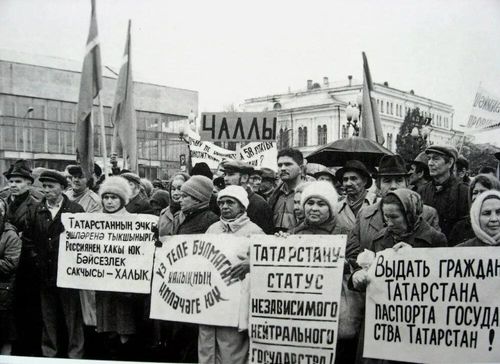From the Tsars to Putin: the Colonial Legacy of Russia

How do age-old imperial myths still influence Russian politics, culture and the mindset of its citizens?
The Western colonial project has been a subject of numerous studies and discussions, but few in the West have considered examining Russia as an empire — in both the past and the present — before Moscow launched an expansionist war at Europe’s doorstep in 2022.
Despite a dominating perception of Russia as a mono-ethnic and monocultural state, the country is home to representatives of more than 180 different ethnicities, most of whom came to be citizens of the country as a result of its colonial expansion. Throughout history, Russia has continuously expanded its territory through war and the suppression of neighbouring nations and Indigenous cultures: from the Russian conquest of Kazan and Siberia to the forced annexation and russification of Central Asia, the Caucasus and other regions.
As a result of that history, more than 25 million Indigenous people and ethnic minorities live in Russia today. The pressure of russification and cultural assimilation, racial and religious violence, as well as structural racism are just a few issues that have defined the life of these groups in Russia for centuries and continue to this day.
As the war in Ukraine rages on, at De Balie we explore the past and present of Russia’s colonial project, how it influences the lives of millions of people in Russia and the diaspora today and what it means for the country’s — and Europe’s — future.
What defines Russian imperialism? How are Russian imperial myths still influencing Putin’s state policy? And how can these age-old narratives be successfully challenged?
About the speakers
Leyla Latypova is a Tatar journalist and political analyst from Bashkortostan. She is a special correspondent with The Moscow Times, where she leads the outlet’s trailblazing English-language coverage of Russia’s ethnic republics and regions. Her pioneering work on Russia’s indigenous and minoritized communities was published by other notable outlets, including the London School of Economics, Foreign Policy and Meduza. In addition to journalism, Leyla has over a decade of research experience on applied nonviolent resistance in Russia, Central Asia, the Caucasus, and the Balkans.
Durdana Khudaybergen, originally from Karakalpakstan, is an activist for environmental, women’s, and minority rights. She work as an advisor for European Commission programs in the northern Netherlands and volunteers with The Actiefonds as a post-Soviet region specialist. Durdana also has experience across Central Asia and Eastern Europe — including roles at Bankwatch, the Global Green Grants Fund, and Médecins Sans Frontières.
Vladimir Son is a Koryo-saram born in Central Asia. A queer Asian of Russian Federation, he dedicated his activism to improving Asian representation in the Russian-speaking LGBTQ+ community, especially in the aftermath of the Russian invasion of Ukraine. Son is the founder of Invisible Rainbow, a project spotlighting stories of BAME LGBTQ+ people from post-Soviet space and a volunteer of Nomads Indigenous Collective e.V.